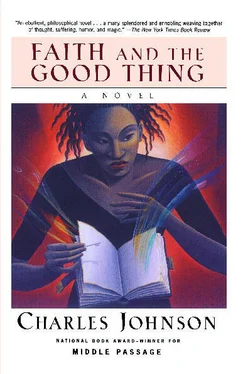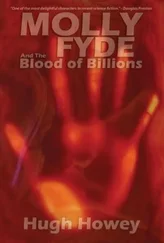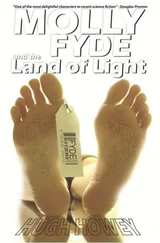Shuddering, Faith looked away.
“Come over here,” the Swamp Woman said.
Faith obeyed, but came no closer than four feet as the werewitch squeezed blood from the chicken’s head onto one of her cluttered workbenches. She placed a monocle over her green eye and studied the puddle carefully, twisting her head from left to right, snorting, chuckling, and following with her three left forefingers the contour of the puddle.
“What’s it say?” Faith asked.
“It says that whatever is is either a substance or an attribute, mind or matter with the absolute certainty of the external world grounded in the self-evident fact that God could not be an Evil Deceiver and still be all-good.”
“What does that mean?”
The Swamp Woman frowned. “I ain’t sure. Let’s look at the liver.” Faith turned her head as the Swamp Woman dug inside the chicken and extracted the liver. She held it close to her yellow eye, like a gem-cutter inspecting a diamond, or an old philosopher studying an atomic proposition, and grimaced:
“The liver’s in Latin! I can’t read no goddamn Latin!”
Faith groaned, about to despair, but the Swamp Woman suddenly became animated, screeching, “I’ve got just the thing for you, sweetheart,” and she lurched out the door. Faith rushed to the cauldron and felt her dress. It was dry, almost crisp to her touch, and she pulled it quickly over her head. From outside there came the squealing of a hog in distress. Faith took the opportunity to inspect her surroundings.
A museum: that was the only way to relate the host of marvelous, mystical contraptions scattered throughout the room. Nailed to one of the walls was a rotten ferryboat oar from the Styx. Wood there was from the cross at Calvary, strewn as kindling beneath a stove. A philosopher’s stone held the door open, and speckled philosopher’s eggs lay in weed-woven baskets on the workbenches. There were imaguncula — clay, wax, and wooden figures of lute-playing satyrs and mermen used for divination. Among them Faith also found the likenesses of many residents of Hatten County, including a figure of Reverend Brown with a needle stuck in his right side. There were magic drums stretched with reindeer hide, rings shaped like the sacred serpent oύρoβóρoζ and, toward the rear of the room, a small table with a free-swinging pendulum beneath it. The table’s surface held metal plates bearing the numbers of the alphabet, and above it was a sign: COMMUNICOGRAPH — DO NOT TOUCH.
Faith touched it.
And the metal plates on the surface became illuminated with a sea-green glow, spelling first the word “Listen;” then, “Find yourself that good thing,” and finally, “Momma.”
Lights on the Communicograph flickered out and its plates went cold. Faith found herself drawn to a waist-high urn of water on one of the tables. She recalled hearing of magic bottles filled with electrified water that would, if a child asked it questions, respond with pictures for answers. The almost forgotten word whispered by conjure men rolled off her tongue, “Th. Thaumaturgic Mirror.” That was it. All one need do was ask.
“What,” Faith said, “will become of me?”
Water in the urn began to churn. Looking over its rim, she saw images forming, floating along the wet surface. There was first her own reflection; then she saw herself seated sleeping among many empty seats with a sign hung from her neck. Next: the bespeckled face of a wide-eyed man whose thin lips moved faster than the wings of frightened thrushes. Again, the water churned, offering this time phantasmagoric scenes of a stone-and-mortar building surrounded by dense smoke, of a wretched little room overlooking an alley where rats and worms sifted through garbage for scraps of food. Faces were yielded by the water — the image of an old man coughing and clutching a mysterious black book, another man — younger, high-yellow, and wearing a wig. She saw the back of a lean man who wore work clothing, and knew she would recognize him if he turned around. The man did not turn. His figure was replaced by a scene that caught Faith’s breath: an infant girl ringed by rising tongues of fire.
Cloudy, the water offered no more. It returned to its clear consistency as the Swamp Woman tramped back into the room, both her hands filled with steaming hog entrails. These she dumped in the center of the floor. The werewitch wound the intestines around to form a crude pentagram, deposited the kidney, colon, spleen, stomach, and the rest in the middle, and wiped her red hands along the front of her gown. On her haunches, she sneered, “All right — give!”
Obediently, one end of the intestines wiggled into the air and bent toward the northwest. It wavered like a long finger for a few moments, turned black, and drifted to the floor as ashes.
“Go to Chicago,” the Swamp Woman said wearily, sweeping the ashes under a table with her foot.
Faith beamed. “It’s there ?”
“I dunno. Why the hell you town folks think I know every thing? I’m not the Sphinx, y’know. You saw what happened the same as I did.” The Swamp Woman scooped up the remaining entrails and dropped them into the cat’s dish, still grumbling. “Sometimes hog guts is unreliable. Coyote or dingo innards is best, but there’s a shortage on.”
Taking Faith by her arm, chilling her with a touch that was at once moist and mushy despite the Swamp Woman’s strong grip, the werewitch sat her again on the pallet, and positioned herself nearby. Absentmindedly, she chewed on her talons.
“Honey,” she said, “I seen ya comin’ years ago, and I knew you’d be wantin’ to ask about the Good Thing. I’ve got to be truthful with ya. I was readin’ a horse’s brain for old Widow Smith in town, and I seen yer face just as plain as day in the occipital lobe. ”
“You know if I’ll find it, then?” Faith squealed. “You do, don’t you?”
The Swamp Woman played with her nose, which must have had the consistency of putty, for she shaped it between her fingers first with flaring nostrils, then as flat. Finally, she chose to leave it as a long beak between her eyes, and said, “I never was too good on futures, levitation, or resurrections, but I sho ’nuff know how the Good Thing was lost.”
Despite her dread, Faith leaned forward, entranced by the werewitch’s rasping voice.
“Long, long ago, way before your time, the world was way different than it is now. Now, you can look at it, and sometimes it’ll appear like a stately ancient oak, a century’s product of patience and time, broad and beautiful from its gnarled trunk to its treetops; then, at other times, it’ll look rotten, child, hoary and as hollow as a politician’s head, fulla maggots as big as yer fist.
“But it wasn’t always that way. Uhh, huhn. Once, men knew their place and were loath to leave it: paradise. Do ya hear me? Paradise. They didn’t live on the airy summits of Olympus, nor did they dwell along the straits of Ultima Thule. They had no nectar, no ambrosia; what they had, child, was the Good Thing — the one thing so good that no greater good can be conceived. Imagine, child, imagine awakening in the mild blue mist of morningtime to stand on the edge of another day filled from daybreak to dusk with the Good Thing; not just your Good Thing, but everybody’s Good Thing as it manifests itself in an infinity of forms. Folks fancied that the gods put those forms of the Good Thing in the world. Now you can say men put them there — through dreaming, through some ancient need for order and certainty, and gave the gods credit, fooling themselves. But that way of putting it isn’t pretty, and all good stories (and true ones too) have to be pretty, even the ugly ones. So I’m telling you that man’s ethical life was quite in order ages ago. That is, until the day the restless one, Kujichagulia, was born.
Читать дальше












